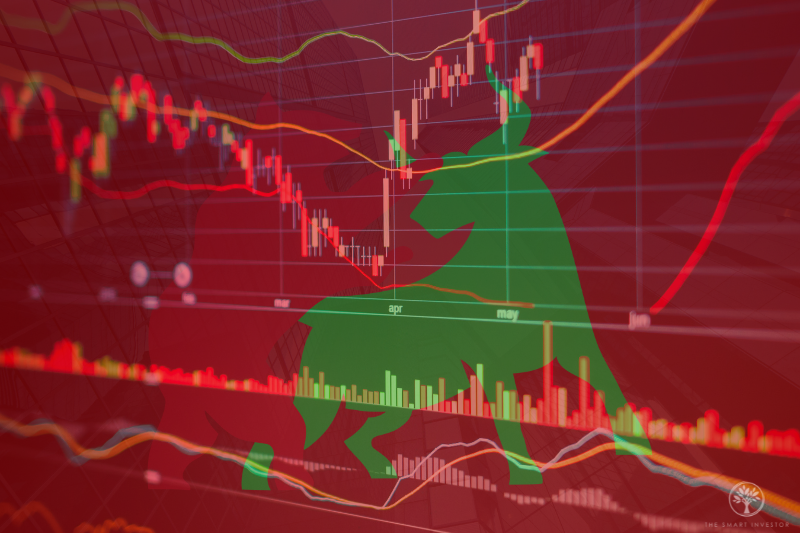On Friday, the US-based S&P 500 (INDEXSP: .INX) fell 10% below its 52-week high, sending the index into correction territory.
Meanwhile, Singapore’s Straits Times Index (SGX: ^STI) is a whisker away from being down double-digits as well.
Some stocks have fared worse.
For instance, Apple (NASDAQ: AAPL), the largest component within the S&P 500, is down 15% from its recent peak. Closer to home, shares of Singtel (SGX: Z74) remain down almost 17% from its 52-week high.
In other words, shares are generally cheaper.
And as share prices fall, your chances of earning a higher return increases.
Yet, not all investors are interested in investing in stocks today. Instead, many are considering adding bonds to their investment portfolio.
What you can expect from stocks and bonds
What returns can you expect from stocks and bonds?
Recently, wealth manager Ben Carlson shared the diagram below, derived from Jeremy Siegel’s 2022 Edition of Stocks for the Long Run.
Note: Real returns are total returns minus inflation.
Over the long term, stocks have posted real returns of 6.8% per year since 1802.
Bonds, on the other hand, have managed around 3.5% per year over the same period.
At first glance, the difference of 3.3 percentage points between stocks and bonds does not seem like much.
Given enough time, you’ll be surprised how significant a few percentage points can make.
According to Siegel, a dollar invested in stocks, compounding at a rate of 6.8% per annum, would yield over US$2 million by June 2023. By comparison, a bond with a 3.5% annual real return will only manage US$1,855.
Granted, the time period here is well over two centuries.
But the point remains: while bonds can provide a steady return, stocks provide way better returns over the long run.
In essence, the question is less about what you should invest in, but rather, what do you want to achieve?
For the retirees who have accumulated a HUGE amount of wealth during their working life, six-month T-bills offering an interest rate of 3.95% could be sufficient for their financial needs.
But if you need more than that, stocks provide an option for higher returns.
Holding for the long term
Here’s the one thing to remember during downturns …
When stocks are sold off, the sellers are not doing so because they know what is going to happen.
They are doing so because they don’t know what is going to happen, and are assuming the worst.
In other words, they are panic selling.
At times like these, it’s important to remember that we are NOT fortune tellers.
When you invest, you are taking a stake in a business — and that’s where your attention should be.
You are better off focusing on factors that can help a company survive over the long haul.
What stocks should you look for?
Well, you can start by looking for these traits …
Strong market position: Tough market conditions will affect all industry players in the same way. As such, focusing on the market leaders with a dominant position is a good place to start. If all the companies within the industry are impacted, chances are, the strongest ones will survive the fallout better than the weaker ones.
Cash on the balance sheet: Most companies run into trouble when they run out of cash. As such, focusing on companies with strong balance sheets will tilt the odds in your favour. Cash will help companies keep their lights on.
Strong operating cash flow: Again, cash is key. Companies with long histories of generating strong operating cash flow are more likely to weather the economic storms and come out stronger. Capital expenditure can be delayed, freeing up valuable cash for ongoing expenses.
That’s what we do at The Smart Dividend Portfolio and The Smart All Stars Portfolio.
Instead of worrying over where the stock market is headed next, we are following the business developments and curating the best stocks we can find.
Get Smart: Have a watchlist ready
Maybe you think that today is not the right time to invest.
But what if the market falls further and you decide that you want to invest?
Will you be ready to act?
Will you have a list of stocks that you want to buy?
Not many investors can answer confidently.
First-time investors: We’ve finally released our beginner’s guide to investing. Read it in an afternoon, follow the principles, pick an investing style and buy your first SGX stocks within the next few hours! Click here to download it for free.
Follow us on Facebook and Telegram for the latest investing news and analyses!
Disclosure: Chin Hui Leong owns shares of Apple.

